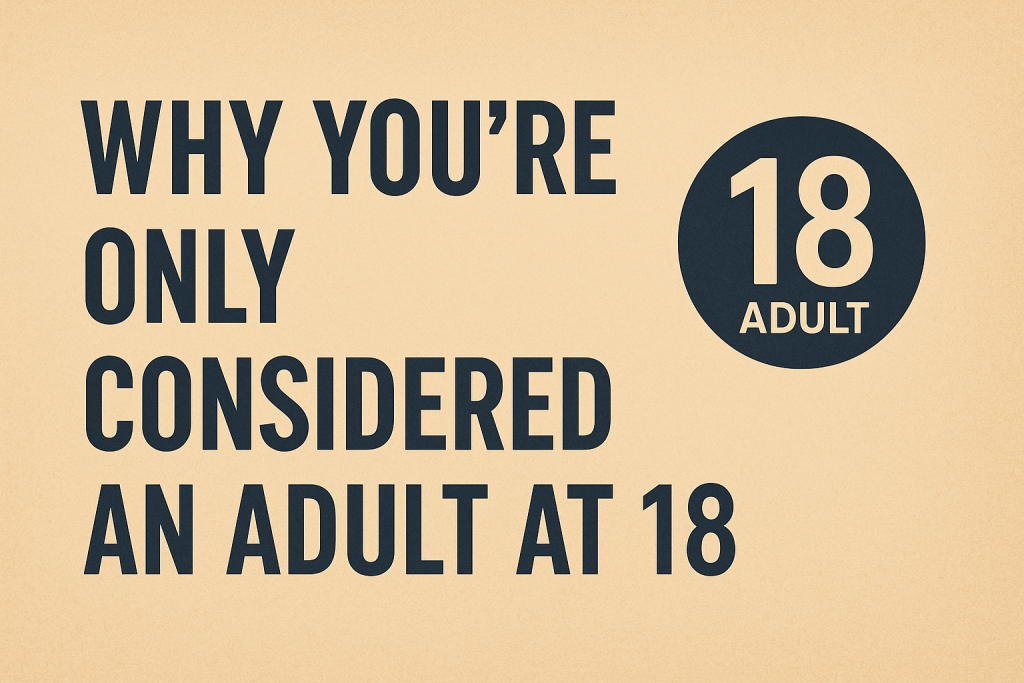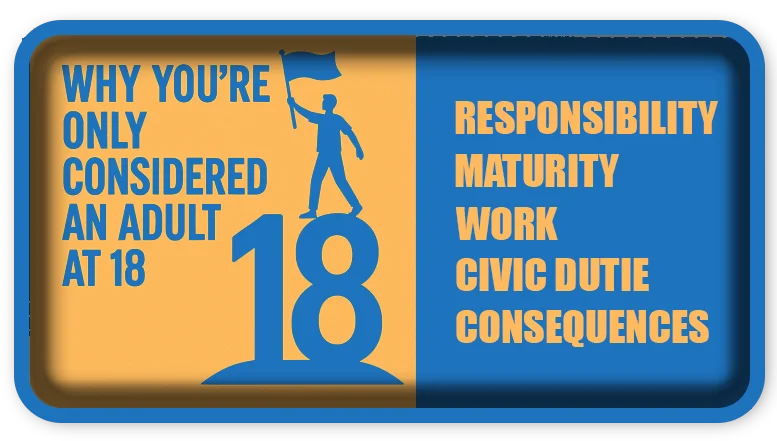⏲️ Estimated reading time: 5 min
Why You’re Only Considered an Adult at 18. In most countries, turning 18 marks the official transition from childhood to adulthood. Discover why this specific age was chosen, what rights it grants you, and the biological, legal, and cultural reasons behind adulthood beginning at 18.
Why You’re Only Considered an Adult at 18
Around the world, the age of 18 is widely accepted as the official moment when a person becomes a legal adult. This milestone isn’t arbitrary it’s backed by historical, legal, psychological, and cultural reasoning. But what does it truly mean to be an adult, and why is adulthood linked to this specific number? Let’s explore the full picture.
1. Historical Origins of the 18-Year Threshold
Throughout history, the age at which someone was considered an adult varied significantly across cultures, religions, and societies. In ancient times, teenagers were sent to war or married as early as 13 or 14. However, in the modern era, with the rise of human rights and legal systems, there was a growing need for a clear and standardized age of legal maturity.
During the 20th century, most countries adopted 18 years old as the legal age of adulthood especially after World War II, when civic participation, such as voting, became a cornerstone of democratic societies.
2. Biological Maturity: The Body Grows Before the Mind
Many people wonder: if a teenager looks like an adult by age 16, why not consider them an adult then? The answer lies in the difference between biological and psychological maturity.
- The human body typically completes puberty between ages 16 and 18, so physically, one may appear grown-up.
- However, the brain especially the prefrontal cortex, which governs judgment, impulse control, and risk assessment continues developing until around age 25.
Therefore, 18 is seen as a compromise late enough for most of adolescence to be behind you, but early enough to integrate young people into adult society.
3. Legal Implications: When You’re Fully Responsible
The law needs clear lines to determine when someone can be fully accountable. At 18, a person gains full legal capacity, which means they can:
- Vote in elections
- Sign contracts independently
- Be held criminally responsible as an adult
- Work full-time without restrictions
- Marry without parental consent
- Apply for loans or credit cards
But along with these rights comes legal responsibility you can no longer be treated as a minor in the eyes of the justice system.
4. International Conventions and Children’s Rights
Another major reason for the legal age of 18 is the United Nations Convention on the Rights of the Child, which defines:
“A child means every human being below the age of eighteen years unless under the law applicable to the child, majority is attained earlier.”
This convention helped establish 18 as the global benchmark for childhood protection, prompting nations to develop laws and policies tailored to minors in education, healthcare, and juvenile justice.
5. Cultural Symbolism: A Modern Rite of Passage
In many societies, turning 18 is viewed as a symbolic rite of passage:
- It usually marks the end of high school.
- Many young people begin university or start working.
- Some move out of their parents’ home.
- Others get their driver’s license or travel abroad independently.
Even without a formal ceremony, age 18 represents the start of personal independence and adult identity.
6. Are There Exceptions? Yes, But Rare
Not all countries apply the same standards:
- In Brazil and Kuwait, voting is allowed at age 16.
- In Iran or Saudi Arabia, religious laws influence the age of maturity.
- In some jurisdictions, minors may be tried as adults depending on the severity of the crime.
Still, 18 remains the international legal standard, especially in Western democracies.
7. Why Not 16 or 21?
Historically, some countries considered 21 as the age of majority (e.g., the U.S. until the 1970s), while others experimented with lower thresholds like 16. Yet neither has become the universal norm.
- 16 is often seen as too young for full legal responsibility.
- 21 may delay civic participation and autonomy unnecessarily.
Thus, 18 is a middle ground mature enough to assume key rights, but early enough to allow full integration into adult roles.

8. What Does Being an Adult Truly Mean?
Being an adult is more than reaching a legal age. It means:
- Taking responsibility for your actions and decisions
- Managing your emotions and relationships with maturity
- Contributing to society through work, civic duties, and lawful behavior
- Owning your consequences good or bad
Turning 18 opens the legal door to adulthood, but real maturity takes time, effort, and life experience.
Turning 18 is far more than just a birthday. It’s a symbol and a legal declaration that you’re now accountable for your own path. While not everyone matures at the same rate, this age offers a standardized, practical moment to shift from protection to responsibility.
Whether you’re preparing to reach this milestone or guiding someone toward it, understanding its significance can help you navigate adulthood with clarity and confidence.
📩 Do you have questions or suggestions? Leave a comment or contact us!
🏷️ Tags: adulthood age, legal maturity, age of majority, turning 18, child rights, responsibility, psychological development, teenage transition, international law, cultural adulthood
Only logged-in users can submit reports.
Discover more from HelpZone
Subscribe to get the latest posts sent to your email.

